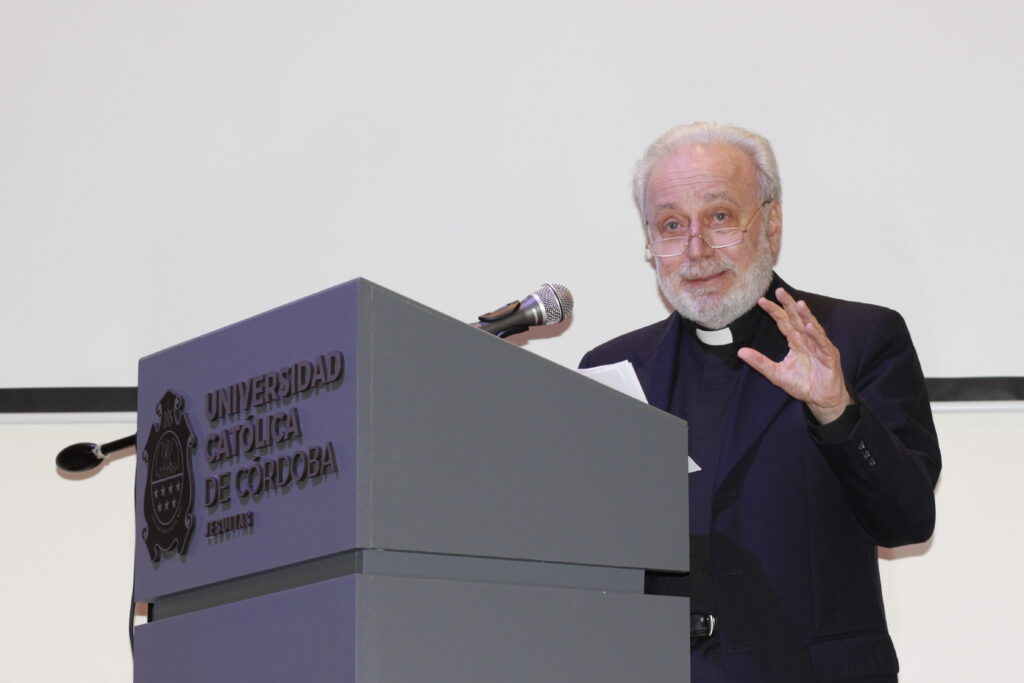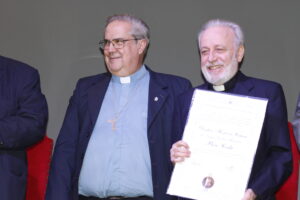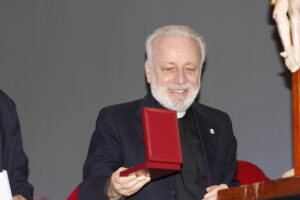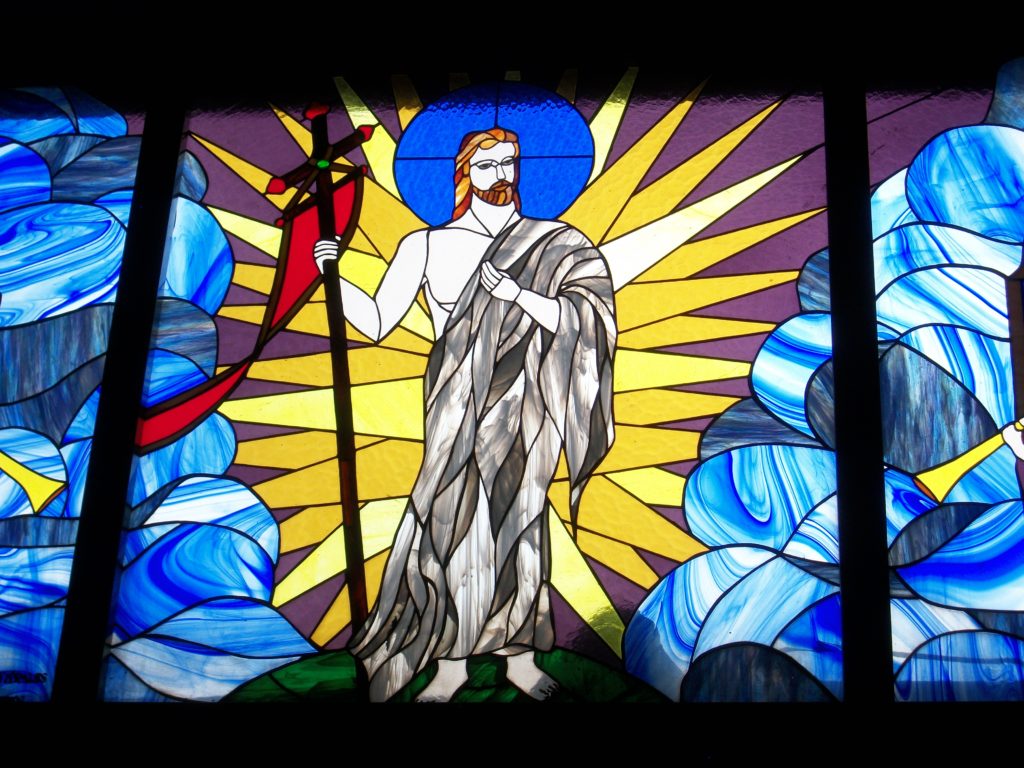Piero Coda, “doctor trinitatis”
In the week of March 4 to 8, we had the joy of the visit to Argentina of Monsignor Piero Coda, to receive the Honoris Causa Doctorate from the Catholic University of Córdoba (UCC), the only House of Higher Studies of the Society of Jesus in the country. Also counting on the support of the […]

In the week of March 4 to 8, we had the joy of the visit to Argentina of Monsignor Piero Coda, to receive the Honoris Causa Doctorate from the Catholic University of Córdoba (UCC), the only House of Higher Studies of the Society of Jesus in the country. Also counting on the support of the Sophia University Institute and the Latin American Episcopal Council (CELAM), other activities were carried out, highlighting the International Seminar of experts (mostly theologians from different contexts and charismas) on Trinitarian Anthropology, in operation since 2013 and with numerous group publications.
Born in Cafasse (Turin, Italy) in 1955, Coda is an eminent theologian, author of numerous academic works and articles, standing out for his intellectual contributions to Trinitarian Ontology and the Theology of Communion, and for his commitment to the culture of encounter and peace, in an intercultural and inter-religious key, as he learned from Chiara Lubich. As a Priest of the diocese of Frascati (Italy), Coda carried out important pastoral responsibilities linked to culture, being a prominent member of the Focolare Movement, whose founder he met around 1978, maintaining a fruitful friendship until the death of Lubich, whose current of spiritual and social renewal had been approved in 1962 with the official name of the Work of Mary.
Regarding his academic career, Monsignor Coda received a doctorate in philosophy from the University of Turin and in theology from the Lateran University of Rome, where he was a professor of dogmatic theology. Over the years, Coda put his intellectual capacities at the service ad intra and ad extra of the Church, in dialogue with the world. In this sense, it is worth noting that he has been a member of the Pontifical Academy of Theology (of which he was prelate secretary from 2003 to 2008) and of the Italian Theological Association (of which he was president between 2003 and 2011). Lubich herself entrusted him with the lofty mission of launching, practically from scratch and in record time, the Sophia University, in Loppiano (near Florence). Under Coda’s leadership, this project would become a reality. One of his first graduates, Tommaso Bertolasi, who later continued his doctoral studies at the UCC, gives a reliable account of this.
In addition to the above, Coda is a member of the Joint Commission for Theological Dialogue between the Catholic Church and the Orthodox Church. Here it is worth highlighting his friendship with Patriarch Bartholomew I of Constantinople, a figure who in turn inspired, through ecumenical dialogue, Pope Francis to write his first social encyclical, Laudato Si’.
 This ecclesial service continues to this day, with Dr. Coda being Secretary General of the International Theological Commission (constituting the first of Italian nationality to occupy that high position), Consultant of the Congregation for the Doctrine of the Faith and of the Pontifical Council for Unity of the Christians. He is also active in promoting theological dialogue between the Catholic Church and Islam.
This ecclesial service continues to this day, with Dr. Coda being Secretary General of the International Theological Commission (constituting the first of Italian nationality to occupy that high position), Consultant of the Congregation for the Doctrine of the Faith and of the Pontifical Council for Unity of the Christians. He is also active in promoting theological dialogue between the Catholic Church and Islam.
It is especially worth highlighting his membership in the Theological Commission for the Synodal Process of the General Secretariat of the Synod of Bishops, an event that – according to what he expressed in his first public act in the city of Córdoba – is the most important fact of the contemporary Church, then of the Sacrosanct Vatican Council II. Furthermore, he noted there – citing the bold words of Mother Ignacia in the synodal hall – “this Synod achieved a subversive act”, since it tried to “go against the current”, jumping the painful polarization that tears apart the social and ecclesial communion. when the question “which side are you on?” prevails. Taking the words of José Daniel López, sj, Dean of the Faculty of Philosophy and Humanities of the UCC, the Synod, in effect, is an authentic epochal kairós, a favorable time to walk towards new horizons, in solidarity with the human family.
This ecclesial service continues to this day, with Dr. Coda being Secretary General of the International Theological Commission (constituting the first of Italian nationality to occupy that high position), Consultant of the Congregation for the Doctrine of the Faith and of the Pontifical Council for Unity of the Christians. He is also active in promoting theological dialogue between the Catholic Church and Islam.
It is especially worth highlighting his membership in the Theological Commission for the Synodal Process of the General Secretariat of the Synod of Bishops, an event that – according to what he expressed in his first public act in the city of Córdoba – is the most important fact of the contemporary Church, then of the Sacrosanct Vatican Council II. Furthermore, he noted there – citing the bold words of Mother Ignacia in the synodal hall – “this Synod achieved a subversive act”, since it tried to “go against the current”, jumping the painful polarization that tears apart the social and ecclesial communion. when the question “which side are you on?” prevails. Taking the words of José Daniel López, sj, Dean of the Faculty of Philosophy and Humanities of the UCC, the Synod, in effect, is an authentic epochal kairós, a favorable time to walk towards new horizons, in solidarity with the human family.
The granting of the Honoris Causa Doctorate to Piero Coda took into account his vast theological and spiritual work that, in various ways, has also enriched the Ecclesiastical Faculties of Philosophy and Theology of the Society of Jesus in Argentina, incorporated into the UCC and whose approval by the Holy See occurred 90 years ago. Doctor Coda links these academic units with a relationship of encouragement and friendship, and common research projects, among which the seminar on Trinitarian Anthropology stands out. Monsignor Coda is also a member of the Academic Committee of the Stromata magazine and Member of the Honorary Council of the “Juan Carlos Scannone, sj” Institute of Philosophical Research, with whom he had a close friendship, of mutual recognition. When the remembered “Cachito” died in 2019, Piero Coda proposed, in my opinion, the best definition of the eminent philosopher from San Miguel, whom he called a “Father of the Latin American Church.” Furthermore, it is worth highlighting Coda’s support and encouragement for the project directed by Iván Ariel Fresia, sdb, for the publication of the Complete Works of Scannone, who could have been a “Father” because he did not stop having a “child” heart, according to the Gospel, Coda recalled these days.
At the delivery of the Doctorate, the Laudatio was given by Gonzalo Zarazaga, sj, who made a detailed outline of Coda’s contributions to Trinitarian Ontology, in the line of authors such as Karl Rahner and Klaus Hemmerle and taking up Coda Dalla’s book Trinita. The advent of God after history and prophecy. For his part, Cardinal Ángel Rossi, sj, Archbishop of Córdoba and Grand Chancellor of the University, defined the Italian theologian as “a pilgrim of the truth”, someone who is “in exodus”. Along these lines were the brief words of Andrés Aguerre, sj, Rector of the UCC, and José María Cantó, sj, Dean of the Faculty of Theology of said university.
 In his Lectio magistralis, of scholarly content, but said with the simplicity and clarity of the great thinkers, Coda referred to central aspects of Trinitarian studies, both at the speculative level (responding, for example, to Immanuel Kant on the relevance of the Trinitarian conception of divinity, according to Christianity) and in the praxis embodied in political, social and cultural realities, without neglecting the mystical level (with reference both to the relationship between the “inner castle” and the “outer castle”, as well as also to the complementarity between a “classical” charisma – the Ignatian – and another “contemporary” – the Focolarino-). From Coda’s conference we can say that reciprocity is the new name of the Trinity, leaving open Zarazaga’s question of whether it would be possible to speak not only of the filioque, but also of the spiritusque and the patrisque. The thing is that, as the poet Paul Claudel said of the Eucharist, the mystery of the Trinity is also “an enormity.” In line with Coda’s approach, Pope Francis points out: “The divine Persons are subsistent relationships, and the world, created according to the divine model, is a web of relationships. (…) This not only invites us to admire the multiple connections that exist between creatures, but also leads us to discover a key to our own fulfillment. Because the human person grows more, more matures and more sanctifies himself as he enters into relationship, when he goes out of himself to live in communion with God, with others and with all creatures. Thus he assumes in her own existence that Trinitarian dynamism that God has imprinted on her since his creation. Everything is connected, and that invites us to mature a spirituality of global solidarity that springs from the mystery of the Trinity” (LS 240). And, as he expressed in the open conversation with Alejandro Mingo, the “cry” of the crucified Son today is particularly felt in the drama of wars. There Coda cited the Italian politician and patrologist Igino Giordani (one of the co-founders of the Focolare), who considered war “a deicide”, for killing God by killing human beings. A reference that, as Roberto Tomichá Charupá suggests, perhaps in our days can be designated as “ecocide”, due to the ecological drama that makes both the cry of the earth and the cry of the poor rise to heaven (Cf. LS 49).
In his Lectio magistralis, of scholarly content, but said with the simplicity and clarity of the great thinkers, Coda referred to central aspects of Trinitarian studies, both at the speculative level (responding, for example, to Immanuel Kant on the relevance of the Trinitarian conception of divinity, according to Christianity) and in the praxis embodied in political, social and cultural realities, without neglecting the mystical level (with reference both to the relationship between the “inner castle” and the “outer castle”, as well as also to the complementarity between a “classical” charisma – the Ignatian – and another “contemporary” – the Focolarino-). From Coda’s conference we can say that reciprocity is the new name of the Trinity, leaving open Zarazaga’s question of whether it would be possible to speak not only of the filioque, but also of the spiritusque and the patrisque. The thing is that, as the poet Paul Claudel said of the Eucharist, the mystery of the Trinity is also “an enormity.” In line with Coda’s approach, Pope Francis points out: “The divine Persons are subsistent relationships, and the world, created according to the divine model, is a web of relationships. (…) This not only invites us to admire the multiple connections that exist between creatures, but also leads us to discover a key to our own fulfillment. Because the human person grows more, more matures and more sanctifies himself as he enters into relationship, when he goes out of himself to live in communion with God, with others and with all creatures. Thus he assumes in her own existence that Trinitarian dynamism that God has imprinted on her since his creation. Everything is connected, and that invites us to mature a spirituality of global solidarity that springs from the mystery of the Trinity” (LS 240). And, as he expressed in the open conversation with Alejandro Mingo, the “cry” of the crucified Son today is particularly felt in the drama of wars. There Coda cited the Italian politician and patrologist Igino Giordani (one of the co-founders of the Focolare), who considered war “a deicide”, for killing God by killing human beings. A reference that, as Roberto Tomichá Charupá suggests, perhaps in our days can be designated as “ecocide”, due to the ecological drama that makes both the cry of the earth and the cry of the poor rise to heaven (Cf. LS 49).
In these days shared with Piero Coda, I can testify that it is “an intelligence without fear, without fatigue and without pride.” I was struck by her ability to listen to others and, above all, to listen personally and synodically to the Holy Spirit, as María Cristina Ventura (“Tirsa”) noted when remembering the passage from Matthew 18:19-20, in one of the pleasant after-dinner meals in the house of the “Pious Disciples of the Divine Master”.
Just as Coda proposed that Scannone be distinguished as an “honorary doctor in culture of unity” by Sophia University (a distinction received by José Daniel López, on behalf of “Cachito”), as we could see, now he was honored by the University Catholic of Córdoba. Thus, a reciprocity between Latin America and Europe took place, reflected in the fruitful work of the Trinitarian Anthropology Group, of which Piero and “Cachito” were founding members, generously encouraging many of their colleagues (who for reasons of space I have not been able to name here). ). Let us give thanks then for this happy exchange of gifts, for this reciprocity, to celebrate – in unity and distinction – with the “rhythm” of the Trinity. It may sound abstract, but rather it is affective and effective, since Saint Augustine already said it: “you see the Trinity if you see love.”
Dr. Aníbal Germán Torres
Related

The Perspectivas del Trabajo Foundation is founded with the aim of promoting virtues for professional development
Exaudi Staff
25 April, 2025
2 min

Reflection by Bishop Enrique Díaz: Alleluia, alleluia
Enrique Díaz
20 April, 2025
5 min

Christ is Risen! Alleluia! Commentary by Fr. Jorge Miró
Jorge Miró
20 April, 2025
3 min

Easter: Mystery of Freedom
Carlos J. Gallardo
20 April, 2025
5 min
 (EN)
(EN)
 (ES)
(ES)
 (IT)
(IT)

